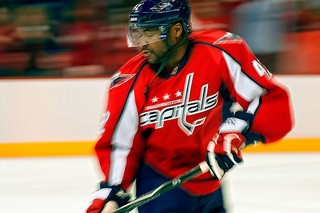
photo credit: clydeorama via photopin cc
Mario Balotelli was born in Italy. He became a citizen at the age of 18, as soon as he was able to do so. He plays soccer for AC Milan and the Italian national team, and is damn good. But because he is the son of Ghanaian immigrants, occasionally his countrymen chant monkey noises at him.
Closer to home, Joel Ward is a right winger for the Washington Capitals. Bruins fans know him all too well. On the ice, Ward stands out as one of the few black players in hockey. In 2012, his goal won Game 7 of a first-round playoff series against the Bruins. On Twitter, Ward’s reward was a lot of angry Bruin fans directing the N-word towards him.
Richard Sherman is probably the best cornerback in the NFL, and certainly not afraid to let you know this. The Seahawks are going to the Super Bowl in part because Sherman knocked away a pass that resulted in a game-ending interception in the NFC Championship game. He gave a very excitable and perhaps untactful interview immediately following the final whistle. It wasn’t long before his picture on Wikipedia was replaced with a picture of a monkey. On Twitter he was barraged with the same sort of abuse that Ward received, namely the N-word and words that essentially mean the N-word. That was the day before Martin Luther King Day.
Racism isn’t new, of course. And it’s easy to mark the latter two examples under the ever-growing category of “idiots being stupid on the internet.” But what is it about sports that has this unique ability to cajole bigotry out into plain sight?
Sports and racism intersect because they are both, in one way or another, about superiority. Among popular forms of entertainment, sports are uniquely meritocratic; in theory, success and skill on the field of play are perfectly correlated. No retail expert touts Walmart’s profit margins as evidence of high quality products and service. Music lovers can argue for days about the respective merits of their favorite bands, but quality in art is more or less a subjective matter on which there are are few right or wrong answers. Sports, meanwhile, exist to (make lots of money, and) answer the question of “who is better?” Baseball integrated before society because owners (even, eventually, Tom Yawkey) realized that black players could help them win games. You would think this fat left the bigots speechless. But Bill Russell won handfuls of rings in Boston before the busing crisis.
This meritocracy of sports doesn’t extend to being a fan. In no other field are people expected to remain loyal to a clearly inferior product. But here, loyalty and the fear of being labeled a bandwagoner chain fans to their teams, for better or worse. So as sports fans, people who don’t care for feeling inferior are made to create ways to excuse or deny bad games and bad seasons. Even Yankees fans are now familiar with rebuilding years. Bitter fans will spit out the notion that “the better team lost,” and while that isn’t always wrong, it serves as an invitation for mockery. And sometimes even the most delusional of fans have trouble denying what they saw, and can’t in good conscience blame bad luck or biased officiating for their team’s failures.
If you are of the bizarre and unsubstantiated opinion that races other than your own are inherently inferior, then you have an out. While you cannot have eyes and reject the athletic superiority of a Richard Sherman or Mario Balotelli, being a racist affords fans, in a perverse, intellectually bankrupt way, a superiority that can’t be trumped. Star athletes will grow old, and one day lack the ability to compete professionally. It’s possible that misfortune and poor decisions could leave them without their wealth. But they will always be black. In comparison to that fact, athletic success can be made to look small and fleeting. And—never mind the mental contortions required to ignore the existence of black players on their own teams—this gives some fans the superiority they’re seeking.
